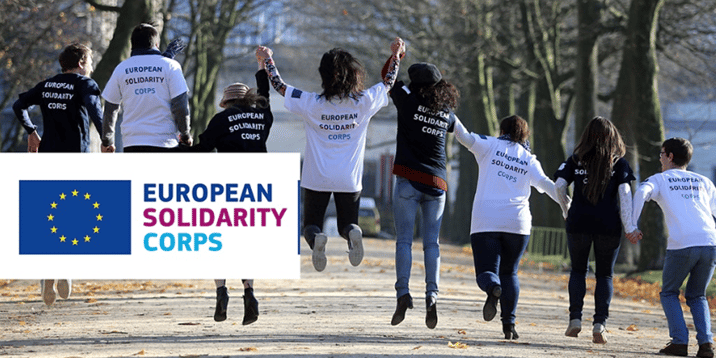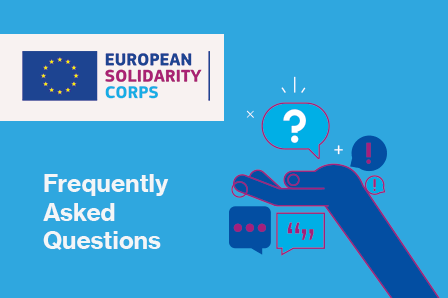European Solidarity Corps, Virtual Mobilities and COVID-19
Two members of the Léargas team have come together to reflect on COVID-19's impact on recent projects as well as its potential implications for upcoming ones. Suzanne Kavanagh, Senior Support and Development Officer with the European Solidarity Corps, and Emmanuelle Place, Finance Officer for Erasmus+ (Youth) and the European Solidarity Corps, share their insights and advice when considering virtual mobilities in the context of the global pandemic.
The themes of solidarity, compassion and teamwork took on even more poignancy this year as Europe desperately grappled with the countless challenges presented by a global pandemic. As our newsfeeds flooded with reports and images concerning those most affected, there was an outpouring of support across Europe. Understandably, there was also considerable fear and panic, but amid it all, the innovative and creative began to step up to the plate.
Throughout Europe, organisations working on the frontline were still hosting European Solidarity Corps volunteers. The spread of the virus and the potential impact on the most vulnerable in our society spurred organisations to respond to the crisis, placing public health at the forefront of their decision-making. Many organisations, including Irish organisations, began implementing safety procedures to minimise the impact of the virus.
And Then Came Lockdown
The organisations reacted quickly to these measures, admirably navigating unprecedented terrain to the best of their ability. The safety and wellbeing of the volunteers was paramount. Indeed, many of their volunteers were from heavily impacted countries, had elderly family and were unable to travel. Organisations took a proactive approach to everyone's safety and quickly provided extra support to ensure that volunteers' fears and worries were acknowledged and addressed - something Léargas was heartened to witness.
As lockdown necessitated the closure of some organisations' offices, they responded by taking a virtual approach and moved activities online. Volunteers continued to support the work of the organisations: their input was immeasurable and their efforts were never as desperately needed as in 2020.
Creativity in the Context of COVID
With the volunteers' efforts in mind, let's consider Nicolas Lelorrain's experience.
Nicolas, who is from France, was taking part in a year-long placement with eurÓg European Youth Centre in Killarney when the the pandemic forced the Kerry Diocesan Youth Services to close its youth centres, and France to close its borders.
Nicolas, who had been helping to run KDYS youth cafés, delivering a Human Rights Education programme, and assisting youth workers in running training programmes for young people in the community, found himself in a precarious position.
He was unable to continue his placement in the typical fashion and he was unable to return to his homeplace.
Displaying ingenuity in the face of adversity, Nicolas decided to produce two videos which he hoped would help potential volunteers, and act as a bridge between himself and current volunteers. As such, the videos document his time as an ESC volunteer, detail his experience in Killarney, shine a light on his hopes for the future, and offer insights into how his experience has deepened his understanding of the concept of solidarity.
As Kevin Murphy, eurÓg Social Enterprise Manager, KDYS, says: "The videos present a unique take on a young, European volunteer’s perspective of life in Ireland in the middle of this worldwide pandemic. Nicolas has also undertaken to paint a new mural on the grounds of eurÓg Eurpoean Youth Centre, which marks his participation with the Solidarity Corps in Killarney during these trying times."
In producing the videos and creating the mural, Nicolas embodied the core values of the ESC, and his endeavours acted as a timely reminder of the positive and innovative nature of its volunteers.
You can watch Nicolas' video on being a Volunteer in Ireland and his video about being a Volunteer during a pandemic on YouTube..jpg?width=676&name=Nicolas%20wall%20(1).jpg)
What's Next?
Now that restrictions have - to a certain extent - lessened and we attempt to navigate a 'new normal', the work continues. Organisations now have the benefit of experience while planning to implement projects in 2021. The potential risks include cluster outbreaks, localised lockdowns and travel restrictions, and are just some examples of issues which can affect the implementation of a project.
The good news is that these risks can be mitigated with the support of the Commission’s agreed new flexibility. Organisations have the option to postpone or delay their project. They can also extend the end of their projects for up to 24 months, and implement online or virtual activities that will contribute to a blended project.
With this new flexibility in mind, why not take a look at some FAQs related to Virtual Mobilities in the context of COVID?
In the Context of COVID: FAQs about Virtual Mobilities
My volunteer needs to quarantine for two weeks once they arrive in Ireland - is this a virtual mobility?
NO. Once the volunteer is physically in Ireland, the mobility is considered a normal physical activity and 100% of the funding is available to the organisation.
My volunteer is in Ireland. If we go into lockdown again, is this a virtual activity?
NO. Once the volunteer is physically in Ireland, the mobility is considered a normal physical activity and 100% of the funding is available to the organisation.
If the organisation is closed due to lock down BUT the volunteer is still working remotely from their rented accommodation, it is considered the same as a physical activity.
My volunteer is in Ireland. What happens if we go into lockdown again, and the volunteer decides to go home?
If the volunteer decides to go home due to another lockdown and they are working remotely from their home country and linking with their hosting organisation in Ireland, it is considered a normal physical activity and 100% of the funding is available to the organisation.
My volunteer is in Ireland. What happens if we go into lockdown again, and the volunteer decides to go home but stops taking part in the project?
If the volunteer decides to go home due to another lockdown BUT is NOT working remotely from their home country and linking with their hosting organisation in Ireland, the project activity for that volunteer ends on the day they go home.
My volunteer is in Ireland. What happens if we go into lockdown again, and the volunteer decides to stay or cannot go home but cannot work remotely?
In this scenario, the project activity stops for that volunteer, no pocket money is to be paid to the volunteer but accommodation costs and food for the volunteer will be covered until the volunteer can safely go home.
What if my volunteer is tested positive for COVID-19 while in Ireland working?
The volunteer will have to self-isolate. The project is still running, the costs are still eligible and the activity can resume once the volunteer is better.
I have a volunteer selected, but they cannot travel yet due to COVID-19 travel restrictions. What are my options?
Option A – Delay your activity start date, your volunteer will travel when it is safe to do so.
Option B – Postpone your project end date to allow more flexibility regarding the start date of the activity.
Option C – The volunteer starts the activity virtually from their home country and then travels to Ireland when it is safe to do so. Remember they will still have to self-isolate for two weeks once they arrive in Ireland.
My volunteer came to Ireland but had to go home due to the pandemic. Can they do another ESC project?
Yes they can, up to a maximum of 12 months altogether.
Contact Suzanne to find out more about ESC mobilities, or Emmanuelle for ESC funding support.
